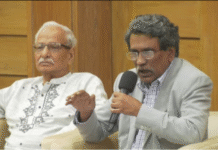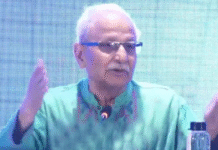Regarding this, former Bangladesh Bank governor Mohammed Farashuddin told Prothom Alo, “The Bangladesh Bank has apparently turned into a department under the finance ministry. No ministry can instruct the central bank under the free market economy. Such practice started when various issues including reduction of cash reserve ratio (CRR) were decided after sitting at a hotel in 2018.”
“We could not even think about such situations during our time. The ministry knew such instructions would not be followed. The central bank has enough knowledge on banking sector, so they should be allowed to take decision independently. Otherwise, this sector would be hampered,” said Mohammed Farashuddin, who was the governor of the central bank in 1998-2001 term.
Formed in 1994 during the tenure of BNP, the Awami League government dissolved this division of the finance ministry in 1998. Now the Financial Institutions Division monitors not only the state-owned banks but also Bangladesh Bank. The central bank’s authority gets weaker day by day while political influence and interferences of powerful businesspersons and bank owners continue to play its part. The central bank itself has reduced exercising its authority too.
Regarding this, the secretary to the Financial Institutions Division Sheikh Mohammad Salim Ullah declined to comment.
Decision changes often
The country’s capital markets became volatile in the beginning of 2020. At the time, several parties including the finance minister, BSEC and Bangladesh Bank governor held meetings in phases to tackle the fall. Finally, banks were given the task to prevent the share market collapse.
Initiative was taken to form new funds outside the legal jurisdiction for investing in stock markets. The Bangladesh Bank on 10 February 2020 used special power bypassing the Bank Company Act and ordered to form Tk 2 billion (200 crore) fund for investing in the share markets. The tenure of the fund was set until 9 February 2025. The central bank also set the rules on its expenditure.
On 23 June 2021, the market regulator approved Beximco Limited to release green shukuk bond to take Tk 3 billion (3,000 crore) from stock market. This fund will have a five-year term and 70 per cent of the fund will be invested in renewable energy project.
On 27 September 2021, the joint secretary of Financial Institutions Division issued an instruction to the central bank’s governor. It states, “Instructions were given to take necessary measures after considering several issues on relaxing or exempting banks’ investment limit for share markets in order to invest in green shukuk bond.” It also instructed the banks to facilitate the investment of entire amount of money of Tk 2 billions in green shukuk bond.
On the same day the Bangladesh Bank issued a revised circular in light with these instructions, allowing the banks to invest the entire fund in green shukuk and extending its term. That means the central bank changed its decision in just a day.
Regarding this, Bangladesh Bank spokesperson Serajul Islam said, “Though they received the letter from the ministry, they took decision after observing the socio economic aspects.”
According to several sources, an unscheduled meeting was held on 3 January this amid the volatile stock market situation with finance secretary Abdur Rouf Talukder in the chair. Sheikh Mohammad Salim Ullah of Financial Institutions Division, Abu Farah Md Naser, deputy governor of Bangladesh Bank, Sheikh Shamsusddin Ahmed, commissioner of BSEC, and other officials concerned also attended the meeting.
Several recommendations were made at the meeting and the BSEC and the Bangladesh Bank were given the responsibility to implement those. The central bank was given two tasks; one is to review the ‘market value’ of the banks’ investment in share market in light with the section 26(A) of the Bank Company Act and receive the opinions of the Financial Institutions Division on this matter.
According to the existing Bank Company Act, when a bank holds shares of any company, share price is assessed as per the existing market prices. But the central and the parties related to share markets have long been confronting each other over whether this share price would be set based on the market price or the purchase price. At that meeting, recommendation was also made to receive the Financial Institutions Division’s opinion on keeping the banks’ Tk 2 billion fund out of the banks’ investment limit for share markets.
However, governor Fazle Kabir rejected both recommendations saying the finance ministry can consult with the central bank, if the former deems it necessary. He also instructed to give no more time for banks that are yet to be scheduled.
People concerned of the central bank said governor, deputy governor and members of board of directors are being appointed through the finance ministry. So, no one can take a decision going against the ministry. Currently, the finance ministry calls the deputy governors and informs them the decision, thus, curbing the regulator’s authority.
Salehuddin Ahmed was the governor of Bangladesh Bank in 2005-2009. Regarding the recent situations, he said such instructions are not a good sign; it is a blow to the central bank’s authority.
As a result, disciplines are being ruined in entire banking sector and banks are getting weaker. The central bank should not just sit idle they must find out the problems and punish the responsible and if the ministry intervenes, they have to inform the government’s higher level, he added.










